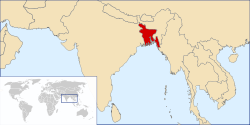| গণপ্রজাতন্ত্রী বাংলাদেশ Gônoprojatontri Bangladesh People's Republic of Bangladesh | ||||||
|---|---|---|---|---|---|---|
| ||||||
| Anthem: Amar Shonar Bangla My Golden Bengal | ||||||
| Capital (and largest city) | Dhaka | |||||
| Official languages | Bengali (or Bangla) | |||||
| Demonym | Bangladeshi | |||||
| Government | Parliamentary republic[1] | |||||
| - | President | Iajuddin Ahmed | ||||
| - | Prime Minister | vacant | ||||
| - | Chief Adviser | Fakhruddin Ahmed | ||||
| Independence | from Pakistan | |||||
| - | Declared | March 26, 1971 | ||||
| - | Victory Day | December 16, 1971 | ||||
| Area | ||||||
| - | Total | 147,570 km² (94th) 55,599 sq mi | ||||
| - | Water (%) | 7.0 | ||||
| Population | ||||||
| - | 2007 estimate | 150,448,340[2] (7th) | ||||
| - | Density | 1045/km² (11th) 2,706/sq mi | ||||
| GDP (PPP) | 2007 estimate | |||||
| - | Total | $206.6 billion[3] (48th) | ||||
| - | Per capita | $1,300[3] (153rd) | ||||
| GDP (nominal) | 2007 estimate | |||||
| - | Total | $72.4 billion[3] (58th) | ||||
| - | Per capita | $455[3] (157th) | ||||
| Gini (2000) | 31.8 (medium) | |||||
| HDI (2007) | ▲ 0.547 (medium) (140th) | |||||
| Currency | Taka (BDT) | |||||
| Time zone | BDT (UTC+6) | |||||
| - | Summer (DST) | not observed (UTC+6) | ||||
| Internet TLD | .bd | |||||
| Calling code | +880 | |||||
| 1 | Adjusted population, p.4, "Population Census 2001, Preliminary Report". Bangladesh Bureau of Statistics (2001-08). | |||||
Bangladesh (Bengali: বাংলাদেশ [ˈbaŋlad̪eʃ] Bangladesh), officially the People's Republic of Bangladesh (Bengali: গণপ্রজাতন্ত্রী বাংলাদেশ Gônoprojatontri Bangladesh) is a country in South Asia. It is bordered by India on all sides except for a small border with Burma to the far southeast and by the Bay of Bengal to the south. Together with the Indian state of West Bengal, it makes up the ethno-linguistic region of Bengal. The name Bangladesh means "Country of Bengal" in the official Bengali language.
The borders of present-day Bangladesh were established with the partition of Bengal and India in 1947, when the region became the eastern wing of the newly-formed Pakistan. However, it was separated from the western wing by 1,600 kilometres (1,000 mi) across India. Political and linguistic discrimination as well as economic neglect led to popular agitations against West Pakistan, which led to the war for independence in 1971 and the establishment of Bangladesh. However, the new state had to endure famines, natural disasters and widespread poverty, as well as political turmoil and military coups. The restoration of democracy in 1991 has been followed by relative stability and economic progress.Bangladesh is among the most densely populated countries in the world and has a high poverty rate. Geographically the country straddles the fertile Ganges-Brahmaputra Delta and is subject to annual monsoon floods and cyclones. The government is a parliamentary democracy; however, political rule has been suspended under emergency law since January 11, 2007. Bangladesh is a member of the Commonwealth of Nations, SAARC, BIMSTEC, the OIC, and the D-8. As the World Bank notes in its July 2005 Country Brief, the country has made significant progress in human development in the areas of literacy, gender parity in schooling and reduction of population growth.




No comments:
Post a Comment